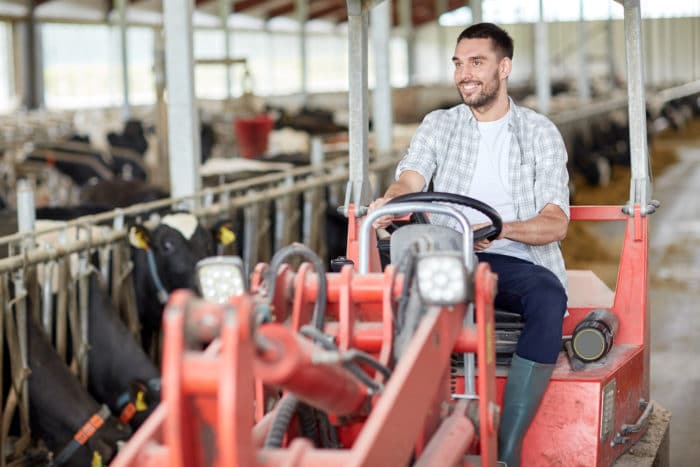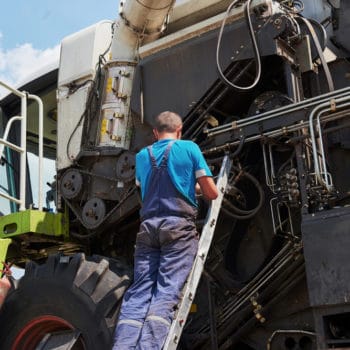Why We Love It
-
$29,380Potential Avg. Salary
-
5.4%Job Growth Rate
-
Growing DemandJob Outlook
-
Outdoor Work EnvironmentCareer Attribute
Farm equipment operators have to be comfortable handling different farm machinery required for harvesting and planting crops, such as rake operators, hay balers, tractors and cutters.
Recommended Schools
What is a Farm Equipment Operator?
Duties
In this role, you will have to perform the following operations to maintain a farm:
- Repair or service farm machinery and equipment as required, and notify your supervisors regarding any malfunctions.
- Operate planting machines for inserting plants into the soil at specified durations.
- Oversee assigned work crews for appropriate planting, weeding and harvesting techniques.
- Use and maintain farm equipment like seed drills and manure spreaders to load and unload maters or crops, and to plant, spray and fertilize crops.
- Spray fertilizer and pesticides on farm to keep pests, weeds and fungus away, with hand sprayers.
Day In The Life
A farm equipment operator is in charge of carrying out essential farming processes like soil preparation, crop harvesting, planting seeds, tilling and fertilizing plants with various equipment, tools and mechanical devices. You will enjoy many physically intensive tasks such as operating equipment, hauling manure, prepping the fields, semi-driving and assisting with other farming operations.
Most of your day will be spent driving a truck or tractor with trailer attached, to load crops or feed a harvesting machine. You will also spray fertilizers or pesticides as required on the farm property, to eliminate threats to crops like insects, weeds and fungus. Lifting heavy objects such as tools and crops, along with other such laborious tasks will be done repeatedly. If you are supervising work crews, you will oversee their performance with farm machinery and implements.
Work Schedule And Typical Hours
Working in this job requires you to have high physical stamina, working outdoors for the most part in very hot or cold temperatures. Timings are irregular, dependent on weather conditions and duration of contract but extend to more than 40 hours per week. Workers in this sector enjoy a seasonal work schedule when additional support with harvesting or planting crops is required, or when animals have to be fed and sheltered. You may have to wear common protective or safety gear such as glasses, gloves, hard hats or life jackets.
Growth Of The Job
The US Bureau of Labour Statistics expects an increase in jobs by 5% in this sector, between 2014 and 2024. In addition, there is a high turnover rate in this job sector due to the intense agricultural work, so future openings are always available in the industry. While a high school diploma is common, getting a 4-H certification or finishing a college certificate course will fast-track your chances of a successful career. Advancing to the position of crew leader or other supervisory roles is also possible, especially if you have a good command of both Spanish and English.
Typical Employers
Employers in this job area are pesticide and fertilizer manufacturers, farms, scientific organizations and government agencies. Examples of employers include: Anderson Hay & Grain, Co., Inc., CSS Farms, Farmin’ Brand LLC, Costa Farms, LLC, Tyson Foods, Inc., Perdue Farms, Inc.
Recommended Schools
How To Become a Farm Equipment Operator
You can start working as a farm equipment operator with little education. However, some jobs such as that of an animal breeder, requires you to at least possess a high school diploma for promising job opportunities. Gaining instruction in subjects like agriculture, science, mathematics, machine shop and driver education, will help you excel in this career path. You can also join a high school development organization such as Future Farmers of America or 4-H to find out more about careers operating agricultural equipment.
To fast-track your employment potential, you can also take a look at certificate programs for mastering skills such as equipment maintenance and operations training. A certificate program will require a year to complete with specialized coursework on hydraulic systems, welding, diesel mechanics and mathematics. Having a mechanical inclination and superior physical condition will also suit the demands of the job.
Employers typically provide some on-the- job instruction in the initial stages, on using farming tools and operating sophisticated machinery. Apart from training, you should have multi-limb coordination since most job duties require strenuous physical effort like hauling grain of the combine, water to a sprayer or fertilizer to air drills. Good vision and manual dexterity are also helpful when working with machinery and adjusting their controls, quickly and repeatedly. Being a quick learner is a must, since you will have to take on operating varied systems like GPS tracking, air drill, sprayer or grain cart.
Farm Equipment Operator Salary Data
We’ve provided you the following to learn more about this career. The salary and growth data on this page comes from recently published Bureau of Labor Statistics data while the recommendations and editorial content are based on our research.
National Anual Salary
Low Range
$21,570Average
$29,380High Range
$42,720National Hourly Wage
Low Range
$10/hrAverage
$14/hrHigh Range
$21/hrHow do Farm Equipment Operator salaries stack up to other jobs across the country? Based on the latest jobs data nationwide, Farm Equipment Operator's can make an average annual salary of $29,380, or $14 per hour. This makes it an Above Average Salary. On the lower end, they can make $21,570 or $10 per hour, perhaps when just starting out or based on the state you live in.
Salary Rankings And Facts
#710 Nationally for All Careers
Programs and Degrees
Here are the most common degrees for becoming a Farm Equipment Operator. a is usually recommended and specifically a degree or coursework that prepares you for the particular field, see below.
Highest Education Among Farm Equipment Operators
- 0.3% Doctorate
- 0.5% Masters
- 3.8% Bachelors
- 3.1% Associates
- 9.6% College
- 26.5% High School
- 56.2% Less than High School
Job Growth Projections and Forecast
2014 Total Jobs
57,8002024 Est. Jobs
60,900Job Growth Rate
5.4%Est. New Jobs
3,100How does Farm Equipment Operator job growth stack up to other jobs across the country? By 2024, there will be a change of 3,100 jobs for a total of 60,900 people employed in the career nationwide. This is a 5.4% change in growth over the next ten years, giving the career a growth rate nationwide of Below Average.
Growth Rankings And Facts
#410 Nationally for All Careers
What Companies Employ The Most Farm Equipment Operators
| Industry | Current Jobs | New Jobs Needed | % Increase |
|---|---|---|---|
| Crop production | 37,200 | 1,300 | 1% |
| Animal production and aquaculture | 6,600 | 800 | 1% |
| Miscellaneous nondurable goods merchant wholesalers | 4,900 | -100 | 0% |

















